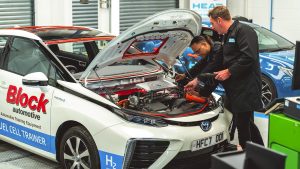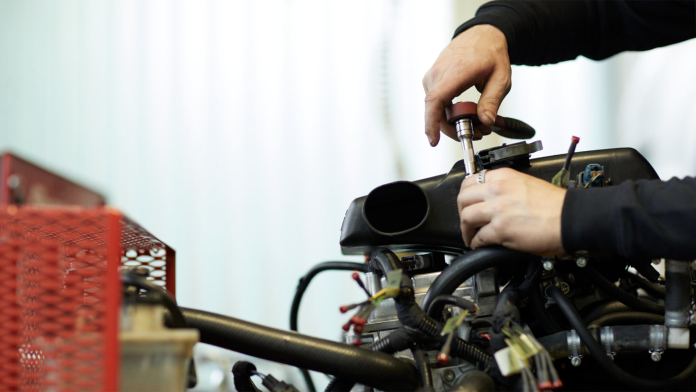Michael Yerbury, Advanced Automotive Technical Trainer at Blackburn College’s Hybrid Electric Automotive Training Centre (HEAT), discusses developments in the EV industry and why training is key to ensuring the UK automotive industry is fit for the future.
The automotive industry has come a long way in the past decade when it comes to electric vehicle (EV) technology and consumer accessibility.
Where once EVs were aimed at the more luxury car buyer, many manufacturers are now planning to adapt their most popular and more affordable models to EV equivalents.
Not only is there more choice for consumers, but ranges are also getting longer as battery technology develops, removing a further barrier to mass adoption.
The growth in EV uptake
SMMT stats show that the uptake of electric vehicles is continuing to grow, with registrations of battery electric vehicles (BEVs) in the UK increasing by 10.6% and plug-in hybrids by 34% from March 2023-24. In comparison, petrol sales have only increased by 7.5% and diesel sales have declined by 10.1% in the same period.
Although the UK Government has extended the ban on petrol and diesel cars to 2035, and there are concerns in the market that the growth of new EV sales is not progressing as fast as anticipated – technicians shouldn’t sleep on this sustainability shift.
Net zero must happen, and decarbonising transport is a major factor in meeting the goal.
The second-hand EV market is hotting up, too. SMMT stats also show that sales of used battery electric cars (BEV) almost doubled in 2023, rising to 90.9%.
This means that second-hand EVs—often out of the manufacturer warranty period and free from dealership-based annual servicing deals—are becoming increasingly commonplace, with more drivers turning to their local garages.
Upskilling the UK automotive industry
With this in mind, it’s imperative that the UK automotive industry is armed with the right skills to deal with EV technology. Right now, a lot of the technical knowledge still sits with the car manufacturers themselves, with the uptake of training only slowly trickling down to private garages.

In fact, research from the Institute of the Motor Industry (IMI) revealed stark gaps in the availability of qualified technicians to work on EVs, with skill levels still inconsistent across the UK. Its January forecast found that only 22% of technicians are EV-qualified. By 2030, the IMI estimates that there will need to be over 100,000 qualified technicians to meet demand.
The UK automotive industry also has great potential to catapult motor vehicle technicians into higher-paying jobs and provide substantial opportunities for business growth for those who embrace EVs today.
Add to this the rise of other alternatively fuelled vehicles, such as those powered by hydrogen, and it’s clear we need to focus on upskilling as a priority.
This is why dedicated centres like Blackburn College’s Hybrid Electric Automotive Training (HEAT) Centre have been set up to provide and develop dedicated training that meets the demands of today’s and future EV technologies. HEAT was opened in 2022 with funding from the Department for Education’s Lancashire Automotive Skills Accelerator Project to focus on electric and hybrid vehicle maintenance and repair through access to cutting-edge technology and facilities.
As well as EVs last year, the College also unveiled a hydrogen fuel cell electric vehicle (FCEV) Toyota Mirai training rig, one of the first of its kind in Further Education. The rig gives students – and the region’s wider automotive industry – practical, hands-on experience to further prepare them for the roll-out of alternatively fuelled vehicles.
Training and upskilling are often put off due to time commitments. Which is understandable when there is a busy garage to run. These centres have been created to combat that challenge. Blackburn College works directly with dealerships and a newly created Independent Garage Network to ensure that the courses developed serve the businesses that need them, as well as ensure that the next generation of technicians are future-ready when they enter the world of work.

This has led to Blackburn College offering Skills Bootcamps and courses for Levels 1-4. Each qualification takes just a few days to complete with automotive industry experts.
Thanks to centres like HEAT, garages can quickly upskill their workforces and ensure they not only remain relevant in a net zero future but can also meet the demands of car owners today.









